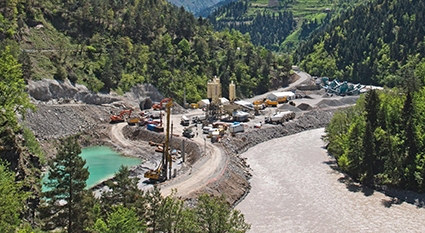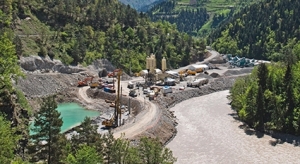Turkish Investment in Adjara Shrinks
In 2016, Turkish investors poured $135 million into the Autonomous Republic of Adjara, on Georgia’s southern Black Sea coast but numbers recently released for 2017 show that Turkish investment decreased 61% to $52.5 million. In 2016, Turkish investments comprised 32% of total investments in Adjara, while in 2017 Turkish investments were just 16% of total regional investments.
Eka Bakhtadze, Head of the Economic Development Department at the Ministry of Finance and Economy of Adjara, blamed the decrease on the completed construction of hydropower plants (HPP) in the region.
“The decline in investments is mainly due to the completion of HPP projects. Namely, from Norway and India and from Turkey...However, there is steady investment in the tourism sector from Turkey, mainly in the construction of hotels and housing,” she explained.
The Shuakhevi HPP began operating at full capacity in summer 2017. From 2015, several international financial institutions came together to realize the project, investing $416 million in the construction and operation of the plant. The project was constructed by Adjaristsqali Georgia – a joint venture between India’s Tata Power, Norway's Clean Energy Invest and the World Bank Group’s International Finance Corporation (IFC).
Turkish company Adjar Energy 2007 signed an agreement with the Georgian government in July, 2011, to construct three HPPs. Khelvachauri Hydro Power Station 1 began operating in March 2017 and Kirnati Hydro Power Station began operating earlier this summer. Khelvachauri Hydro Power Station 2 is set for completion next year. The company plans to invest a total of $200 million in building the three plants, which will have a combined annual output of 560 million KWh.
The Ministry of Finance and Economy of Adjara reports that a total of $365.8 million was invested in Adjara in 2015, 29% ($107.5 mil) of which came from Turkey. In 2016, Adjara received a total of $427.9 million in investments, 32% ($135.6 mil) of which was from Turkey. In 2017, total investment in the region decreased to $330.8 mil – closer to pre-HPP numbers from 2015 – but Turkish investments accounted for just 16%.
Turkey is the second largest country to have invested in Adjara in the past few years. Norway-India share the first place due to the construction of the Shuakhevi and Khulo HPPs (Khulo is set to be completed in 2019). Other significant sources of investment in Adjara include various small projects financed by investors from Azerbaijan, Turkmenistan, and Iraq.
Bakhtadze emphasized the importance of Turkey as an economic partner in a conversation with Batumlebi newspaper, saying “Turkey is our neighbor, and is always interested in our region. Its investment share is quite large. As a neighboring country and one of the most attractive countries for investment, there should be stable relations in the region.”
There has recently been some concern in Georgia about the dominance of Turkish investment, particularly in Batumi, Georgia’s second most populous city. In March 2017, Eurasia Net published an article describing a speech by Turkish President Recep Tayyip Erdogan in October 2016 near the Georgian border in Rize. During his speech, he said, “Our physical boundaries are different from the boundaries of our heart...Is it possible to separate Rize from Batumi?” This caused alarm in Georgia, where there is a long and unforgotten history of territorial integrity being infringed upon – most recently by Russia in Abkhazia and the Tskhinvali region. Turkey’s ambassador to Tbilisi later clarified Erdogan’s comment, saying “Batumi is Georgia and Rize is Turkey and it will always be this way,” but many Georgians are still anxious about the Turkish influence on the Black Sea coast. Adjara spent three centuries under Ottoman rule – lasting until 1878. “Over the past decade and a half, Turkish investments have poured into the region, and today Batumi’s center and the Black Sea shore have been remade by rows of luxury hotels and casinos, largely built with Turkish money... A section of the city’s historic center, once an Armenian quarter, is now dominated by Turkish restaurants, bars, and teahouses. Dozens of ‘Thai massage’ parlors, fronts for prostitution, cater to mostly male Turkish visitors. Far more Turkish than Georgian is heard, and restaurant touts do not bother with any other language,” writes Eurasia Net. casinos not registered with gamstop
“The market should be diversified,” said Bakhtadze, “We are working on this task. The region should not be dependent on the investments of just one country. By diversification, I mean that the percentage of investments from other countries should be increased.”
By Samantha Guthrie











